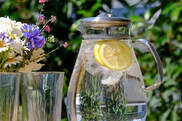 Will a one day water fast provide any real benefit to you? Absolutely! Going a day without consuming any food or beverages (aside from plain water) gives your body a break from the work required to carry out the digestion process. This brief period of rest is extremely beneficial, as it supports the body's natural capacity for repair, self-healing, and rejuvenation. Not eating for a day will also make you aware of just how great a role food plays in your life. As you refrain from eating for the day, you'll discover how much of your eating has less to do with genuine hunger, and more to do with habit or emotional motivation, e.g.: turning to food as a source of comfort. How to carry out a one day water fast. A one day water fast is typically carried out by having your last meal or snack the evening before the day of fasting. During the day of fasting, from the time you wake up until you go to bed at night, you eat consume no food and drink only water. You can resume eating when you wake up the day after the fast. Here are 5 steps to help you get the most out of your one day water fast. 1. Prepare your body by eating lightly beforehand. In the days leading up to your fast, eat a little more lightly than usual, easing up on rich foods and sugary treats. Limit or avoid meat the day before your fast, and focus on consuming fresh fruits and vegetables. This adjustment will prepare your body and make it easier to complete your day of fasting without feeling famished, as the lack of food won't be such a shock to your system.  2. Prepare your environment to support your fast. Fasting, even for a single day, can be challenging, especially if you're dong it for the first time. Anything you can do to create a supportive environment will make things easier. If you keep food or snacks on your desk at work, put them away so they're out of sight. At home, only go into the kitchen if you absolutely must, so your eyes and your mind aren't drawn to food unnecessarily. Rather than stocking up on food right before your fast, schedule your usual grocery trip for after your fast. This way, you won't be preoccupied thinking about all the food you just brought home. 3. Clear your schedule of anything physically or mentally demanding. If you are new to fasting, it's not uncommon to feel a bit lightheaded or low in energy. If you're accustomed to eating three meals a day on a set schedule, missing your regular meals may lead to headaches. These side effects are completely normal and nothing to be concerned about if you're in good health otherwise. However, trying to push through a demanding or stressful day in this condition won't make your fast any easier. Clearing your schedule of anything physically or mentally demanding will ensure you have the freedom to rest and take it easy, should you find yourself feeling tired, lightheaded, or headachy at any time.  4. Plan relaxing activities for the day. As you clear out the demanding activities from your day, schedule in some pleasant, you may find that you have a little more free time on your hands. The last thing you want is to spend that free time thinking about food! Prevent boredom by scheduling some relaxing activities for the day. Keeping yourself occupied will make the time pass more quickly, and your attention will be focused on something other than food. A day of fasting is a great opportunity to engage in practices such as scripture reading, prayer, and meditation. Many people experience a sense of heightened awareness during fasting that enriches these kinds of activities. 5. Drink quality water during your fast. Since water is the only nutrient you'll be consuming for the day, it makes sense to consume the purest water possible. In many cities, tap water contains chlorine, fluoride, along with traces of pesticides, solvents, and other contaminants. If you don't have some kind of water filtration system in place to purify your tap water, consider drinking quality bottled water for the day. However, if you only have access to tap water, go ahead with your fast regardless. You'll still reap all the benefits to your body (as well as your mind and spirit) from a day of fasting from food, as your system gets a much-needed rest. Resuming your diet after your fast: unlike lengthier fasts, a one day fast doesn't require several days to transition back to eating solid food. However, you can maximize the benefits of your one day fast by eating lightly in the days afterwards, and consuming plenty of fresh fruit and vegetables. Comments are closed.
|
Categories
All
|
 RSS Feed
RSS Feed